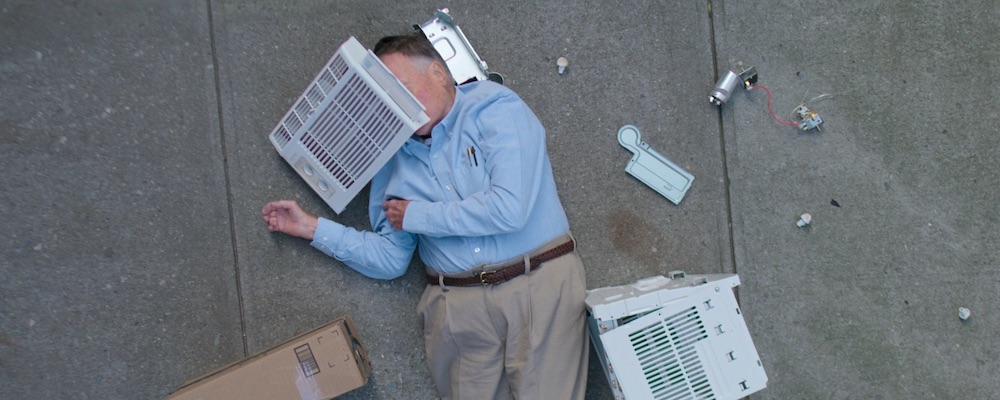‘Dick Johnson Is Dead’ Powerfully Documents Director Kirsten Johnson’s Final Days With Her Dad
Alci Rengifo
Netflix documentary “Dick Johnson Is Dead” is about being aware that death is near for a loved one. It wonders how we should await the moment when it becomes clear how it will arrive. One would expect this to be a somber work, but it’s quite the opposite. Kirsten Johnson aims the lens at her father’s road towards the inevitable with sadness tempered by joy. This documentary teases death, while reflecting with an intimate eye how time slips away from all of us.
The Dick Johnson of the title is the director’s father, a Seattle psychiatrist and widower who is beginning to descend into dementia. Aware Dick needs to be cared for, Johnson begins to help him move in with her in New York. She also uses this time to make a documentary about this moment in their lives. More than just a chronicle, Johnson also devises a series of near gags which are imaginary deaths for her father, ranging from falling air conditioners to construction site accidents. She even fits him into a wooden coffin for a planned memorial with friends. There also visions of heaven included, which are a nod to Dick’s devotion to the Seventh-day Adventist Church faith he raised Johnson in all her life. As father and daughter engage in this cinematic experiment, memories are shared and captured on camera, as well as painful moments of transition.
Hovering over every frame of “Dick Johnson Is Dead” is the director’s knowledge that these are the last, lucid or breathing moments she will have with her father. Johnson has previously been most known for the documentary “Cameraperson,” a rich journey through her work as the lens operator for many documentaries. It is a document of how a camera can capture the world as it is. But here she invites us into a very intimate territory, sharing the pain of knowing she is losing her father, first to dementia, soon to mortality. But sorrow is not the driving force. By having Dick partake in sequences where he is taken out by a flying AC or takes a bloody tumble down some stairs, Johnson is celebrating the idea of spending her final moments with her beloved parent in the best way she knows how. She’s a filmmaker, this is what she does, and Dick himself seems like he’s having a ball. There’s a sweet moment where he is astounded at watching a stunt double take a fall in his place. When makeup is used to fake a gashing throat wound, Dick observes this probably hurts more than the heart attack he already survived. These scenes also have a teasing way of reflecting on the very idea of our coming expiration. We don’t know when or how it will happen for sure, we just know it’s coming at some point in our lives.
Johnson also can’t shake off her religious upbringing and acknowledges it with glittery, dreamy imaginings of heaven for Dick. A rather jolly Jesus washes his feet and even perfects them. Dick was born with a particular foot condition which always caused him insecurities, so Johnson does him the movie magic favor of having the Lord do some work on them. Cut out heads also allow Bruce Lee and Buster Keaton to hang out in Dick’s cinematic afterlife. More moving in these moments are the shots where Johnson imagines a young Dick and a young version of her deceased mom reunited and dancing away across the heavenly plain. It is as if Johnson and Dick, through filmmaking, can face the fear of death together. And not only the fear of death, but the loss of memories that dementia brings.
It’s not all glitter and smiles. Johnson also allows the camera to show us the more harrowing moments of dealing with illness. Dick in his friendly manner, with a hint of somberness, looks helplessly on as his old office is cleared out, an answering machine warns any callers he’s retired. He seems helpless when Johnson has to inform him she’s selling his car. But his heart is large, and when his plush house is sold so he can move into Johnson’s apartment, he admits he would gladly make the sacrifice to live near his offspring. The memory of Johnson’s mother, who also suffered from dementia, provides a powerful side story as well. In one of the documentary’s most striking sequences, we see video footage of Dick’s late wife, lost in a haze of forgetfulness, and Johnson admits it is the only moving images she even has of her. But despair is not a feature of this documentary. As life takes the sort of turns we expect with old age, Dick and Johnson face it head-on, with difficulties, but never losing their familial bond, or sense of joy.
A film like “Dick Johnson Is Dead” features a rare kind of human quality. It’s a testimonial about how we cannot fight against death, and even with life’s unfairness and frustrations, many choose to truly live every last moment possible. Johnson’s documentary is about her father, and has the power of a personal document, but in a sense it is about all of us. One way or another, this is a road we must all travel.
“Dick Johnson Is Dead” begins streaming Oct. 2 on Netflix.

